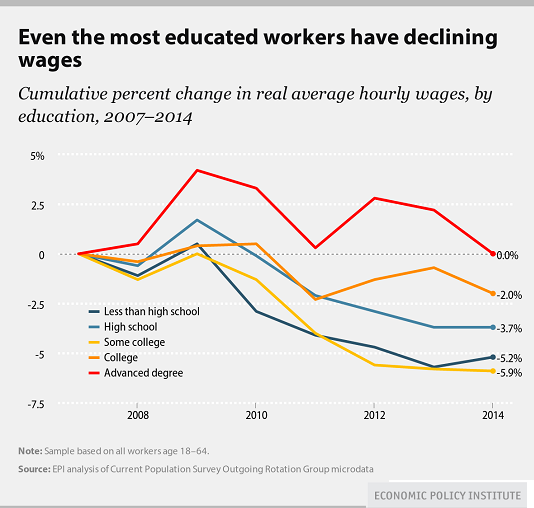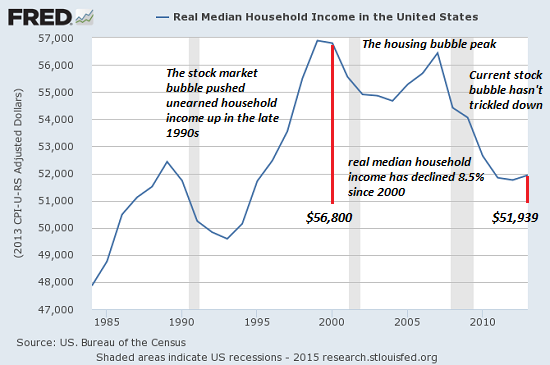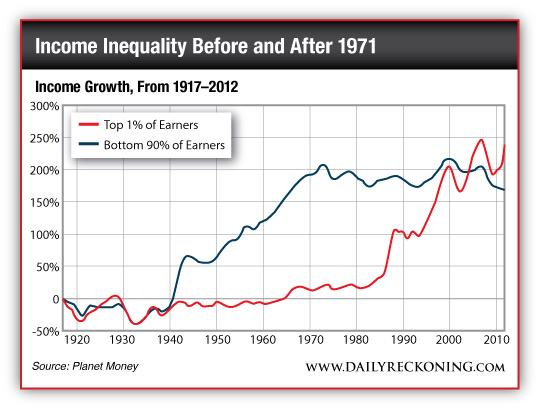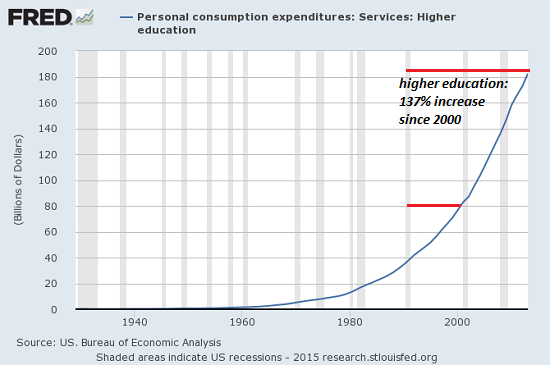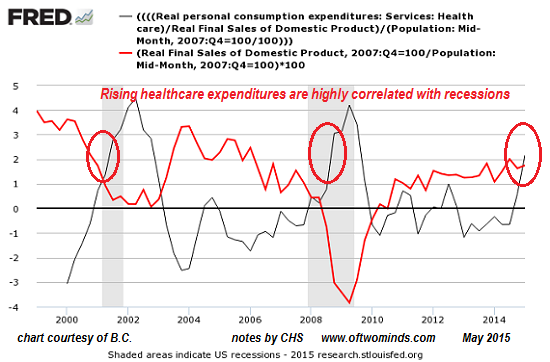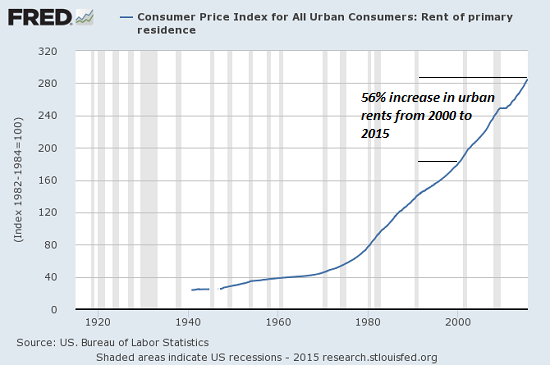Why are costs rising inexorably? The answer in most cases is simple: cartels.
Even if nothing else doomed the status quo, the widening gap between household incomes and costs will push the corrupt contraption over the cliff by itself. The status quo (whatever you wish to call it) requires "growth" to sustain itself--growth in consumption, spending, sales, debt, asset valuations, profits and of course taxes, and ultimately all of those "growths" depend on household incomes.
Incomes even for the most highly educated workers are stagnating:
Adjusted for inflation, median household income is down significantly in the 'recovery":
Some observers quibble that since this doesn't include food stamps and other transfer payments, it isn't accurate: in other words, it's not so bad if we include social welfare.
If the status quo now depends on government payments to households to sustain "growth," then the system is nearing the cliff edge.
Another trend that pushes the contraption closer to oblivion is income disparity:virtually all the non-welfare gains in income have gone to the top 5%, with most of those gains concentrated in the top 1%:
We all know what's happened to major household expenses such as higher education, healthcare, rent/housing: they're soaring to the moon. Here's higher education:
The status quo views additional healthcare spending as an unalloyed good thing, but as this chart (courtesy of B.C.) shows, rising healthcare costs correlate to recessions: it turns out paying $500 for a medication that cost $10 a few years ago isn't the kind of "growth" that the system needs to survive:
Here's urban area rents:
Why are costs rising inexorably? The answer in most cases is simple: cartels.Cartels and quasi-monopolies create artificial scarcities by limiting competition (usually via regulatory collusion with the government). This artificial scarcity enables the cartels to raise prices because consumers have no choice: the "competition" (i.e. the other members of the cartel) have the same prices for the same services.
Take college as an example. The artificial scarcity is accreditation: if the institution isn't accredited, the diplomas it issues are worthless.
Suppose (as I propose in my book
The Nearly Free University and the Emerging Economy) that college diplomas were awarded on the basis of standardized exams and essay questions: the only thing that matters is what the student learned, not what bureaucratic hoops the cartel has erected to protect itself from real competition.
As for healthcare, the cartel hides behind opaque pricing and complex billing that is paid by insurers or the government; the consumer has no choice and no access to the real costs.
Many cartels are obscured by complex ownership arrangements. The majority of the mainstream media is famously owned by six corporations; this concentration of ownership (and thus of political influence) dominates the cartel-state-dominated American economy.
Cartels will fight to the death to retain their privileges and profits. The status quo works just fine for them, and they will never let reform reduce their privileges, power or profits.
But once the average household depends on government handouts just to remain nominally solvent, the slide over the cliff has already started.
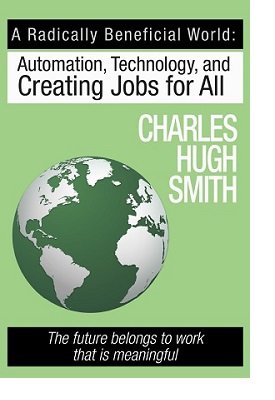
The print edition is $25, but there's a $10 discount this week through my publisher's
page for the book: you must use the code
TL6PDA4D to get the $10 discount. Note this does not include shipping, and requires making the purchase through Createspace.
"Certainly the author is decades ahead of his time. Humanity will eventually adopt the author's principles written in all of his books. Currently, humanity lives in delusion that the system will continue to serve them. We will see massive changes even in the next decade. Don't waste your money on college--buy the author's books and succeed." Book Reader (via Amazon.com)
NOTE: Contributions/subscriptions are acknowledged in the order received. Your name and email remain confidential and will not be given to any other individual, company or agency.
Thank you, Edward P. MD ($50), for your superbly generous contribution to this site -- I am greatly honored by your steadfast support and readership.
| |
Thank you, James K. ($50), for your outstandingly generous contribution to this site -- I am greatly honored by your steadfast support and readership.
|
